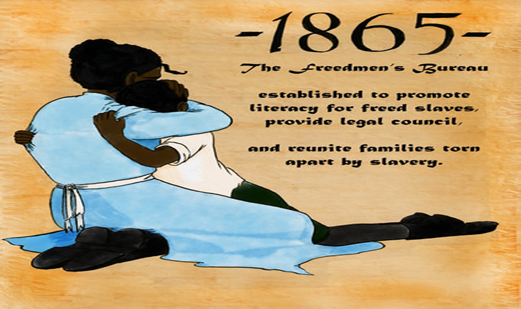Lost Black History
By Don Valentine
The Freedmen’s Bureau [FB] was the federal government’s first attempt at a comprehensive social assistance program. At the end of the Civil war in 1865, the FB was created. Its goal was to facilitate the amalgamation of four million slaves into society. According to the National Archives: “The Bureau was established to undertake the relief effort and the unprecedented social reconstruction that would bring freedpeople to full citizenship.” The FB would best be described as the “8 Track Tape player,” of social services. It had great intentions, but after a few years it was ineffectual! In 1872 the FB was closed.
The program was to function for one year after the close of the war. President Andrew Johnson vetoed new legislation extending the FB’s life and increasing its powers on Feb. 19, 1866. President Johnson viewed the legislation as a continuation of war powers in peacetime. Johnson was inclined to make the reconstruction and reparations on the South as lenient as possible. The FB successfully issued food and clothing, operated hospitals and temporary camps, helped locate family members, promoted education, helped freedpeople legalize marriages, provided employment, supervised labor contracts, provided legal representation, investigated racial confrontations, settled freedpeople on abandoned or confiscated lands. The FB worked with Black soldiers to secure back pay, bounty payments, and pensions.
FB had good intentions, but it was hampered by Southern political contempt and poor management. America’s first Black daily paper, The New Orleans Tribune, blasted the corruption of the FB. This is from the October 31, 1867 issue: “The laborer on the plantation is in the clutches of his employer. Should he be abused or wronged, what are the means of redress? Practically he has none. If he goes to the (Freedmen’s) Bureau agent, he finds there an officer who rides with his employer, who dines with him, and who drinks champagne with him.
Most of the Agents think their particular business is to furnish the planters with cheap hands, and as a consequence to retain at any cost the laborers on the plantations. They are, in fact, the planter’s guards, and nothing else. Every person acquainted with the regime of our country parishes knows what has become of the Bureau’s agencies and the Agents.”
This is another heroic example of the Black press. The Tribune helped organize the Freedmen’s Aid Association. This was a Black controlled option to the forced servitude of the government’s Freedmen’s Bureau. The newspaper called for Black land ownership financed by “a bank of our field hands – who work the land by the sweat of their brows – for the purpose of substituting to the aristocratic planters the WHOLE POWER OF OUR PEOPLE. After having proclaimed the liberty of the workmen, we now have to democratize the capital in their hands.” The FAA succeeded in establishing four worker-controlled plantations in Louisiana. Yes, there were some Black owned Southern plantations. That is another lesson absent from our kids’s studies.
If we don’t know our history, we are doomed to learn “His-story!”

